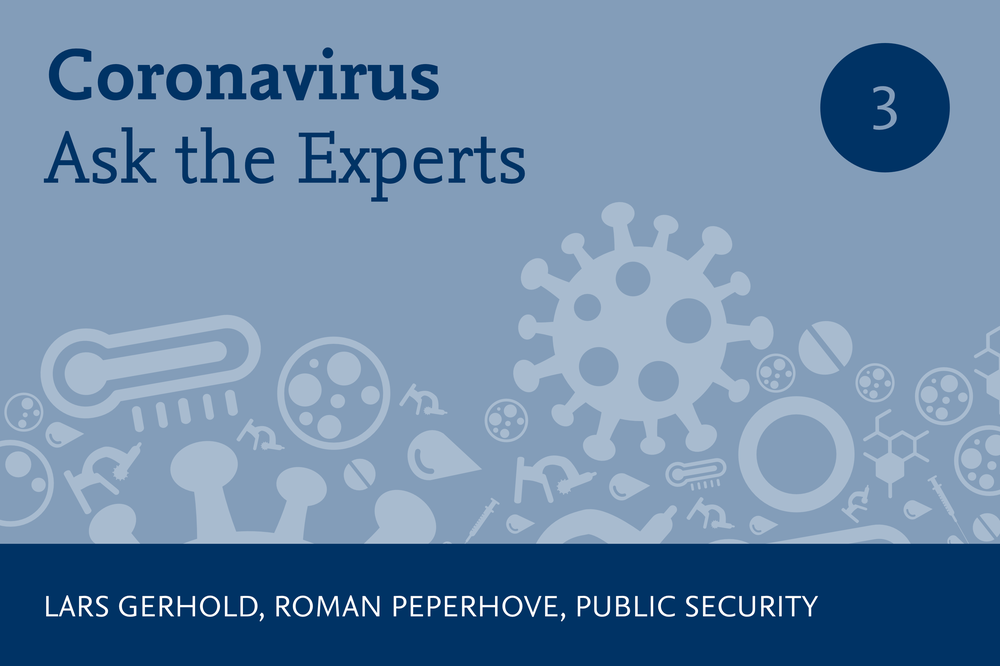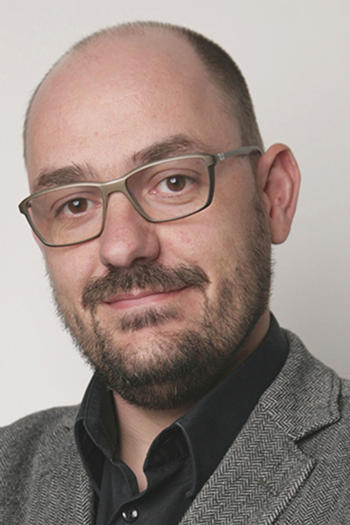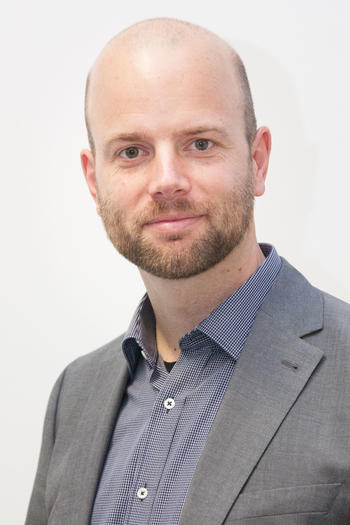“Everyone is potentially affected, but everyone can also do something”
Campus.leben series: “Coronavirus – Ask the Experts” / Part 3: Interview with social scientists Lars Gerhold and Roman Peperhove from the Forschungsforum Öffentliche Sicherheit
Apr 08, 2020
A survey on the risk perception of people in the corona crisis and their coping strategies has just been conducted at Freie Universität Berlin. Professor Lars Gerhold and Roman Peperhove explain the results.
Image Credit: shutterstock.com/khaleddesigner
Two thirds of all Germans are concerned about the current coronavirus pandemic, but fewer than one in three is afraid of being infected. In the current interview in the campus.leben series: “Coronavirus – Ask the Experts,” Professor Lars Gerhold and Roman Peperhove from the Forschungsforum Öffentliche Sicherheit (Research Forum on Public Security) at Freie Universität comment on the results of a recently completed population study. In the new campus.leben series researchers from Freie Universität Berlin are sharing insights on the current situation from their respective professional perspectives.
Professor Gerhold, Mr. Peperhove, you have just completed a study on the risk perception of people in the corona crisis and their coping strategies. What have you found out?
Lars Gerhold: In our representative population study, we can show, for example, that although almost two thirds of Germans state that they feel worried, in comparison, significantly fewer people are afraid of being infected: only 28 percent. It makes a difference whether this type of survey focuses on general or diffuse emotional states or asks about concrete fear.
Prof. Dr. Lars Gerhold heads an interdisciplinary research group on security research and is a project leader in the Forschungsforum Öffentliche Sicherheit.
Image Credit: Personal collection
From criminology, for example, we know that fear is very location-related. Therefore, we were also able to find out that people currently feel much more unsafe in stores and public transportation than in their own home or outside. These are important findings with regard to measures prescribed by the federal and state governments. The findings indicate that people in Germany are very problem-oriented. They adhere to the given restrictions as far as possible and show understanding for them, and in particular, they trust the medical experts.
In parallel to this survey, we are conducting a survey of experts from public authorities and organizations with protective tasks and security research. So far more than 250 experts have responded. Our goal is to compare the view of the population with that of the experts.
One focus of the work of the Research Forum on Public Security is the communication of research results to politicians. Do you also advise policy makers in the current situation?
Roman Peperhove: Yes, we are in touch with political decision makers. On the one hand, we make our current research findings available to decision makers from politics and civil protection. On request, we also provide the basis for decisions, for example, when it comes to the psychosocial situation in the population. But we are not actually part of operational crisis management. That is in the hands of the crisis teams at the federal and state levels, who are much more familiar with the implementation structures than we are. Our task is to generate, prepare, condense, and then make available scientific knowledge. We see ourselves as catalytic science.
From your perspective, what do you think about the current security and supply situation in Germany?
Gerhold: We consider the supply situation in Germany to be very good. Of course, there may be an empty shelf sometimes, but we do not expect bottlenecks. This is also what our project partners from the logistics sector say. For the population, on the other hand, this may feel strange at first. In a situation where it might be better not to go to the supermarket every day because you are better off staying at home and avoiding social contacts to reduce the chance of infection, people start to feel uncertain.
The results of our survey have shown that depending on whether you ask about specific things such as staple foods or more generally about food, around 30 to 40 percent of Germans are buying more than usual. The main reasons given are that they no longer go shopping every day and want to be sure that they have provisions on hand, in case they need to be quarantined. And that's plausible: If you are expected to stay at home, you buy more than usual when you go shopping, but you go less often.
According to a new study Neue Strategien der Ernährungsnotfallvorsorge (New Strategies for Food Emergency Preparedness, NeuENV), about half of the population currently claims to have provisions for about ten days. Five years ago it was just under one third.
Before the corona pandemic, security seemed to be guaranteed mostly through technology such as surveillance cameras or other technical tools. How can security be provided in the current situation?
Gerhold: That is correct. In recent years the emphasis has been on security technology. To increase efficiency and effectiveness, all possible security tasks have been shifted to technical systems, especially the work of the police in public security. Technologies also play an important role in the current situation, for example, in monitoring the course of the pandemic, in collecting current data, and in disseminating scientific findings. There is also the #WirVsVirusHack digital space, set up to facilitate a digital participation process. It enabled more than 1,500 mini-projects to be developed in a short time. Digital solutions for distributing food, measuring the capacity of hospital beds, or for more efficient digital management were discussed.
But you are right. With regard to COVID-19, the individual person plays a greater role than the technical solution. Everyone is potentially affected, but everyone can also do something. Social aspects in dealing with uncertainty are suddenly much more in the foreground. That is also indicated by our findings. The respondents are problem-oriented and try to act in a structured and deliberate manner.
Can recommendations for the future be derived from the work of the Forschungsforum and your observations from the survey?
Peperhove: Currently, three characteristics of coping with the situation are apparent: First, political decisions are based to a large extent on virologic and epidemiological considerations and studies. This view of science and the involvement of science in social and political decisions should be maintained in the future. The Forschungsforum Öffentliche Sicherheit tries, among other things, to facilitate the transfer of knowledge to politicians and authorities and organizations with security tasks through the Future Security Lab, which happens to be located right next to the German Bundestag. The people we advise include representatives of the federal and state ministries, such as the Federal Ministry of the Interior or the Federal Ministry of Education, as well as the heads of organizations, such as the technical relief agency or the fire department.
Second, there is a very strong focus on the medical challenge. Crises and catastrophes, however, are very complex and dynamic. Therefore, the call for an evaluation of the political measures and a holistic assessment of the situation that takes into account the social and psychological aspects of people in quarantine and isolation, is now increasing. That was part of the motivation for our survey.
A third and final point: Security and security research are also subject to thematic fluctuations with limited attention. After the outbreak of the SARS virus in 2003 with some 800 dead, the pandemic received a high level of attention, especially in Asia. However, this type of attention usually disappears once the acute event subsides.
It is important for scientists, together with authorities and organizations with security tasks to insist that such topics and threats are not forgotten and that we should prepare ourselves for different scenarios. Methods from futurology can significantly advance security research. This includes, for example, scenario technology, so-called horizon scanning or general methods of foresight, which enable strategy development for possible future risks. In the Forschungsforum Öffentliche Sicherheit we work on this focus and call it “Security Foresight.”
Christine Boldt conducted the interview.
The original German version of this article was published on April 1, 2020, in campus.leben, the online magazine of Freie Universität Berlin.
Further Information
Read all the interviews in the campus.leben series “Coronavirus – Ask the Experts”:
- Interview with Claudia Müller-Birn: “How should we design the tracing app so that people want to use it?”
- Interview with Tanja Börzel: “The European Union has proven its resilience in times of crisis”
- Interview with Professor Eun-Jeung Lee: “Many countries are now trying to learn from the Korean experience”
- Interview with Professor Joachim Trebbe: “We are communicating more than usual in bubbles”
- Interview with Stefan Gosepath: How Just is Our Society in Times of Crisis?
- Interview with Carolin Auschra: “Organizations and systems often change in times of great crisis”
- Interview with Professor Hansjörg Dilger: “The coronavirus pandemic is a mirror of globalization and the inequalities it has produced”
- Interview with Professor Lars Gerhold and Roman Peperhove: “Everyone is potentially affected, but everyone can also do something”
- Interview with Paul Nolte: “We are going to be working through this trauma for decades to come”
- Interview with Martin Voss: “If we choose to, we can lay the groundwork to shape the future”



